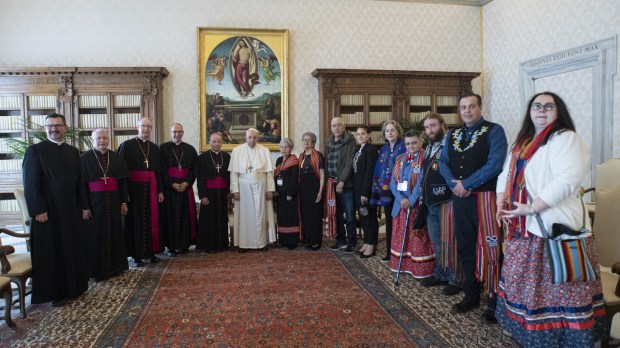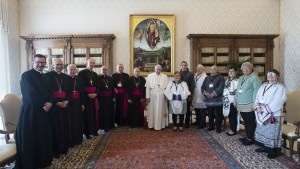Pope Francis met with delegations of Métis and Inuit people from Canada on March 28, 2022. The President of the Canadian Conference of Catholic Bishops, Archbishop Raymond Poisson, who is accompanying the Indigenous representatives, stressed the role of the Pontiff in this dialogue and the importance of this meeting as the beginning of a path of healing and reconciliation for the Catholic Church in Canada and Indigenous peoples.
This week, Pope Francis received two delegations for one hour each. As a participant in these meetings, how do you view this moment, for which the Catholic Church in Canada has been preparing for a long time?
Archbishop Poisson: More than anything else—than petitions, the apologies, or the compensations—the purpose of the time we spent together was to come together. During that time, I must say that the delegates were very faithful to their commitment, to their witness. It was a very peaceful moment, quite moving for some. The Pope listened very carefully and was very attentive. He had a few words to say to them. But it was first of all—as is often the case with him—a heart-to-heart encounter. He took the time to touch them, to bless them, to thank them. These were, I think, very powerful moments for the delegates and for us.
Why did you want to have this meeting with the Pope?
Archbishop Poisson: This trip represented almost three years of work. We wanted to have this meeting to place our reconciliation and healing process at the level of lived experience; both among the survivors and among the elders and the youth who never lived in the residential schools but have heard about them. For me, this dynamic is a whole, a walk that we started together and that will not end with yesterday’s meeting. That’s why in the autumn, after we apologized, we launched a national fund to help projects. We continue and will continue to participate locally in discussion circles, to meet with people on the ground.
What part does the Pope play in this process?
Archbishop Poisson: The Pope has said “yes” to our invitation to visit Canada. This will be a continuation of the meetings we’re having this week. He will come with more than theoretical knowledge because he will have heard the delegates. It’s very different to read a testimony on paper and to hear a person speak to us in a heart-to-heart exchange, expressing his emotions, telling his past or that of his loved ones, or the way he lives today. The Pope has heard all this, and, as he said Monday, will carry it with him during his meditation and prayer for the coming days, in preparation for his statement on Friday but also for his visit.
There is talk of a visit in July or September. When do you think this expected trip could take place?
Archbishop Poisson: For these kinds of announcements, the Vatican is in charge and Canada has to agree. Obviously, we’ve been working on this trip since last December and we have an idea about it; we think it will not happen in January, for example. For now, we have opened three “slots”: two at the end of July and perhaps one in the fall. However, the Holy Father, like the Indigenous people, is keeping in mind the feast of Saint Anne (celebrated every July 26, editor’s note). In Canada, it’s an important holiday (St. Anne is the patron saint of Canada), so I think it will be one of the two “slots” in July. The official announcement should be out soon!
Listening to the delegates, one becomes aware of their great diversity, especially in terms of their demands and their position vis-à-vis the Church or the State. What is your take on this specific characteristic of the Canadian Indigenous communities?
Archbishop Poisson: Pope Francis received two groups Monday and there will be a third on Thursday, that of the First Nations. There’s not much in common among them, except for the problem of residential schools, which has affected them to a greater or lesser extent depending on the group. And there’s not a lot of communication between those groups either. I would even say that through this trip, we’ve facilitated meetings between national delegations, between leaders of the three groups. This was not the case at the beginning of our journey.
The territory of Canada is huge, and there are communities all over the place. Each one is a nation, and communication among them isn’t a given. At the national level, we have presidencies, elected people who are not the “chiefs” and do not necessarily have real power in these communities. I think it’s fair to say that Canadian society doesn’t know its communities well. We don’t know ourselves. This is not only true of Catholics but of everyone. Distance doesn’t help, but that’s not enough. The purpose of our fund, and of the operation we are carrying out, is for us to get to know each other better. And to allow them to make themselves known, to be recognized and respected, which hasn’t been the case and which is still very difficult.
In Canada, there’s a law called the “Indian Act.” This law needs to be revised, but it’s delicate because not everyone is on the same page. But this law makes the Indigenous communities into communities within the big community.
I think it’s fair to say that Canadian society doesn’t know its communities well. We don’t know ourselves.
Monday, the representatives of the communities said that they wanted the Church to play the role of an ally in certain cases to help them assert these rights before the State. What role can the Catholic Church play alongside the Indigenous people?
Archbishop Poisson: This is the meaning of the work we’re doing, the pedagogy of the Church, which is absolutely not that of the government. There’s no judgment in what I’m saying: they are two very different approaches. We are not a government, but rather we offer service and accompaniment, if I may say it this way. This pedagogy that we propose serves all of Canadian society and it also serves the government. This is what I have observed recently with the delegation.
We’ve been preparing this trip for a long time—three years—and at the beginning there was a little bit of perplexity. Then we had to postpone the visit twice because of COVID. Little by little, even the state became interested in the thing. The delegates became so interested that a second, much larger delegation came at their own expense this week. This is the fruit of this pedagogy, with which we propose to walk together.
What we do and what we decide to do, we decide with them, never without them. I think that this is perhaps something that the State is also learning. At least that’s what I’ve heard. I wish we could all use our energies together—the national Indigenous organizations, the government, and ourselves—because our work, I think, has to be beneficial for the whole society, not just for the Catholic Church.
Do you believe that you will be able to respond to all the demands made by the delegations?
Archbishop Poisson: Respond, yes, but it may not be the response that everyone wants. It also depends on each one’s perspectives. I think that there are considerations that are not always put forward; there are historical contexts. We should not look with today’s eyes at what happened yesterday, at what may have been negative. There wasn’t only the negative.
In the past, there was a first agreement with the State and the Court that was settled and the Catholic institutions paid almost $29 million in compensation (in 2013, ed.). We missed our mark at that time, so we went back to the drawing board (in 2021) with a fund of $30 million, more than the amount originally requested. But all this doesn’t always correspond to the way each person looks at this issue. We’re doing our best, we are with them, and we’re very happy to have the delegates with us today.
As for Pope Francis, do you think he can meet their expectations?
Archbishop Poisson: I trust the Pope: he didn’t give us four hours of audience for nothing. Just as he did on Monday, he will know how to address the whole delegation with the appropriate words on Friday. Then, whatever will be in his speech, his proposals, and his decisions, he will bring with him when he comes to Canada, and our path will continue. In my opinion, we must not forget the past, but at the same time we must not stop there. Let’s look at it, let’s be responsible for it, let’s acknowledge it, and from the lessons of history, let’s do better. We’re working for today and tomorrow. As the delegates said at the press conference, it’s also for their children, for the future. Because we have to stop giving them “bad news,” “bad experiences.”
In my opinion, we must not forget the past, but at the same time we must not stop there. Let’s look at it, let’s be responsible for it, let’s acknowledge it, and from the lessons of history, let’s do better. We’re working for today and tomorrow.
Is this a response to what the delegates denounced as “intergenerational trauma?”
Archbishop Poisson: This is the experience of some people who have become adults and who have experienced significant trauma in their childhood. For example, when a father beats his children, the young person who becomes a father in turn has difficulty in a sense assuming his responsibility as a father with his children. The model he has is negative. With this trauma, it’s a bit the same. It’s transmitted from generation to generation, and concerns the relationship to the Church, to institutions or, more generally, to the “white world,” as it was called in the past; that is to say, the European or colonial world or “style.”


